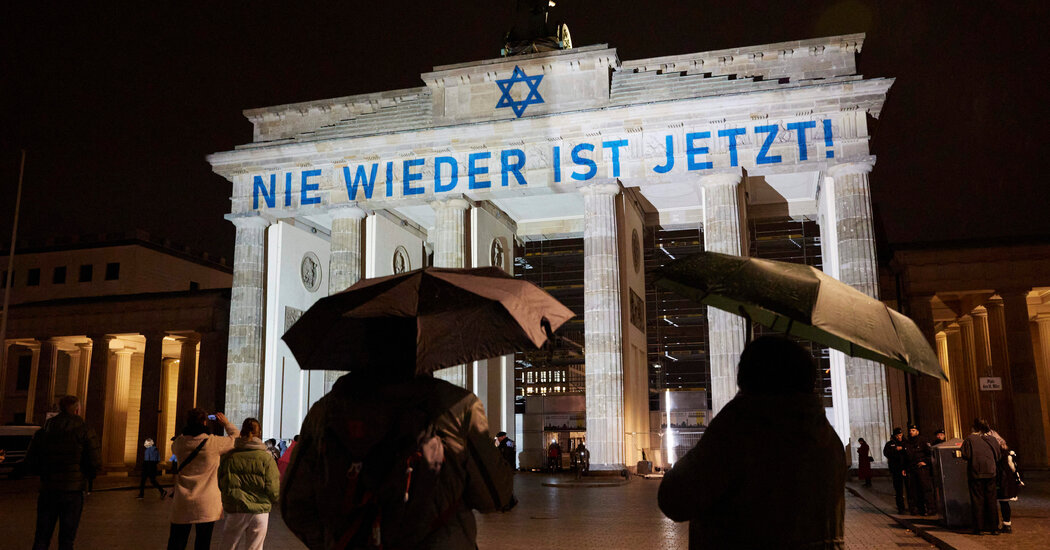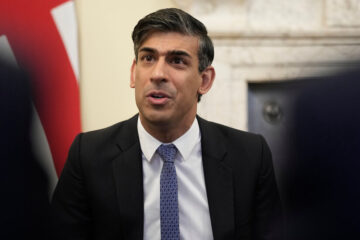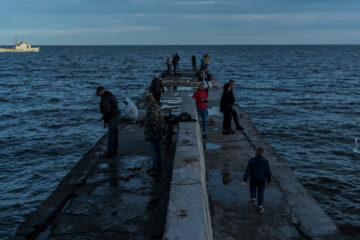[ad_1]
In a moment heavy with symbolism, Germany on Thursday marked the 85th anniversary of Kristallnacht, the eruption of murderous Nazi violence against the country’s Jews on the night of Nov. 9, 1938.
In a nation used to painful soul-searching about its Nazi past, the date marks the moment when Hitler and the National Socialists accelerated the anti-Jewish campaign that would become the Holocaust, orchestrating a nationwide pogrom that included the torching of synagogues and Jewish-owned stores and businesses.
Each year the anniversary is marked by somber vows of “never again” to allow such hatred and violence to be replicated.
On the night of Nov. 9, 1938, uniformed Nazi troops belonging to the S.A. and S.S. led regular Germans in a coordinated attack on Jewish temples, shops, and social gathering places — the fiercest attack on Jewish life since the Nazis took power in 1933. In the rampage of violence, Nazis ransacked and set fire to synagogues, many of which were never rebuilt.
When the attacks of Kristallnacht — or “the Night of Broken Glass” — ended, more than 90 people had been killed, 30,000 people had been sent to concentration camps, and 1,400 synagogues were destroyed, according to Yad Vashem, the World Holocaust Remembrance Center in Israel.
But this year’s anniversary comes against a backdrop of a rise of the far-right in Germany, the Oct. 7 attack on Israel by Hamas and the subsequent Israeli bombardment of Gaza, which has helped fuel a surge of antisemitic attacks across Europe, including in Germany.
While the scale does not approach what occurred 85 years ago, the recent instances of hate — firebombs tossed at a synagogue, ugly daubing of Stars of David on apartments, public calls for the eradication of Israel — have stirred fears in Germany perhaps not felt since World War II.
Even before Thursday’s somber remembrances of one of the dark days on the German national calendar, leaders like Chancellor Olaf Scholz and the country’s president, Frank-Walter Steinmeier, had stood up in recent weeks to issue grave denunciations of the fact that Jewish people were once again living in fear.
On Thursday, Mr. Scholz commemorated the anniversary at a synagogue in Berlin, gathering with Holocaust survivors and families of Hamas kidnapping victims.
“When Jewish women and men are afraid to openly live their religion, their culture, their everyday lives, to exercise their fundamental right to be visible as members of our society,” Mr. Scholz said, “then something is out of control.”
Beth Zion, the synagogue where the commemoration took place, was itself the site of an attack on Oct. 18, when unknown assailants threw two Molotov cocktails at the building.
The firebombs fell short of the building and caused no damage. However, the episode was one of several incidents that have awakened alarm in Germany’s Jewish population.
In his speech, Mr. Scholz spoke “about keeping the promise that was made in the decades after 1945 over and over again. The promise on which our democratic Germany is founded. The promise: Never again. We must keep this promise right now.”
In the aftermath of Hamas’s attack on Israel, the German government has tried to live up to its pledge of unwavering support for Israel while also trying to deliver aid to Gaza.
At home, civil society has registered a rise in antisemitic incidents while Muslim and Arab immigrants complain that legitimate protest is being banned.
Mr. Scholz was the first major Western leader to visit Israel after the Hamas attack. Arriving in Tel Aviv just 10 days later, Mr. Scholz called his trip a “visit with friends during difficult times.”
All of Germany’s mainstream parties have supported Israel’s right to defend itself and have spoken out against rising antisemitism in the wake of the Hamas attack.
Some of the incidents have been carried out by immigrants with roots in the Middle East, the authorities say. On Thursday, Chancellor Scholz referred to an episode just after the Oct. 7 attack, when people in a largely immigrant neighborhood of Berlin celebrated on the streets, handing out sweets.
Speaking at the event at the synagogue, Josef Schuster, the head of the Central Council of Jews in Germany, warned that “antisemitism in Germany has penetrated right into the midst of society.” He said that it is not too late to fix “what has gone wrong in recent years.”
According to the Federal Association of Departments for Research and Information on Antisemitism, or RIAS, an organization that monitors antisemitism, there have been 70 verified antisemitic incidents in Berlin since Oct. 7, a tripling over the same period last year. The incidents range from assaults and insults to protests questioning Israel’s right to exist.
Following the increase, Robert Habeck, the vice chancellor, reiterated Germany’s support for Israel.
“Israel’s right to exist must not be relativized,” he said in a video posted to social media. “Israel’s security is our obligation.”
As part of the day’s commemoration, the World Jewish Congress and the Central Council of Jews coordinated a visual reconstruction of the synagogues destroyed in 1938.
In several cities across Germany, the images of the synagogues that were destroyed that night were projected at the sites where they once stood.
Beth Zion, where Thursday’s commemoration took place, was spared in 1938 because of its location close to other houses. The Nazi attackers worried that by setting fire to the building, they could harm the non-Jewish neighbors.
On Thursday, Mr. Schuster sought to draw similarities between the pogrom in 1938 and the Hamas attack in 2023, calling the latter the “pogrom of our times.”
[ad_2]
Source link




